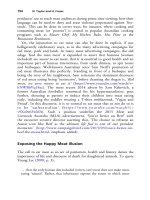The palgrave international handbook of a 24
Bạn đang xem bản rút gọn của tài liệu. Xem và tải ngay bản đầy đủ của tài liệu tại đây (48.27 KB, 1 trang )
Editors’ Introduction
11
production of this book’. In this regard, however, animal abuse is regrettably
present on every page—hidden, in plain sight, as it were—from the destruction of animals’ habitat by the paper industry to the use of animals’ bodies for
glue for binding. This is a sad reminder of the seemingly, inescapable harm
our everyday practices cause our fellow creatures.
References
Beirne, P. (2009). Confronting animal abuse. Lanham, MD: Rowman & Littlefield.
Beirne, P., & South, N. (2007). Issues in green criminology: confronting harms against
environments, humanity and other animals. London: Willan.
Cook, R. (2016). World meat production (1960–present). Beef2Live. />story-world-meat-production-1960-present-0-111818. Accessed 23 May 2016.
Hall, M., Maher, J., Nurse, A. South, N., & Wyatt, T. (Eds.). (2016). Greening
criminology in the 21st century: Contemporary debates and future directions in the
study of environmental harm. London: Routledge.
North American Meat Institute. (2015). The United States meat industry at a glance.
Accessed
23 May 2016.
Samuel, H. (2016). France’s abattoirs to be inspected for animal cruelty after
shock film. The Telegraph. Available at: />2016/03/29/francesabattoirs-to-be-inspected-for-animal-cruelty-after-shock/.
Accessed 20 April 2016.
Singer, P. (1995). Animal liberation. 2nd edition. London: Pimlico.
Dr Jennifer Maher is Senior Lecturer at the Centre for Criminology, University of
South Wales. Her research interests include animal abuse, green criminology,
human-animal studies, and youth and gang violence. She recently concluded a
UK wildlife trafficking study for the FP7 (European Commission) EFFACE project
which evaluated the impact of environmental crime in Europe and is currently
researching puppy smuggling for the Scottish and English Governments. Her
publications include co-editing Greening Criminology in the 21st Century (2016,
Routledge, with M. Hall et al.) and the special journal issue ‘Animal Abuse and
Criminology’ in Crime, Law and Social Change (2011 with P. Beirne).
Dr Harriet Pierpoint is a Reader in Criminology and Criminal Justice at the
Centre for Criminology at University of South Wales. Her research interests relate
to criminal process and vulnerable people, and, more recently, animal abuse. She has
undertaken a number of funded research projects including for the Youth Justice
Board, Home Office, Ministry of Justice and the National Offender Management









